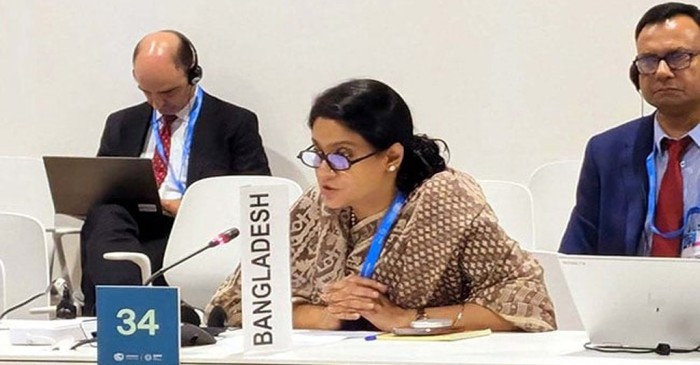

Bangladesh, one of the nations most affected by climate change, is not receiving adequate financial support as promised under international agreements, said the country’s interim government’s environment adviser Syeda Rizwana Hasan.
Talking to UNB during the ongoing COP29 summit in Baku, Rizwana expressed dissatisfaction with the global financing mechanisms, saying that a significant portion of funds is being offered as loans rather than grants.
‘We do not want to take on more debt, this increases our financial burden,’ Rizwana said.
Delays in mitigation measures by developed nations are exacerbating climate risks and reducing disaster management capacities, she said, adding, ‘Our losses are increasing and risks growing due to these delays.’
Rizwana stressed the need for ensuring quick and sufficient disbursement of loss and damage funds and for some disasters like salinity intrusion both financial and technological solutions are needed.
‘To tackle salinity, we need research on how to sustain food and crop production in affected areas. Without adequate funding and technology, it will be challenging for Bangladesh to address such issues,’ she said.
Highlighting Bangladesh’s vulnerability, the adviser said two severe floods this year caused $1.7 billion in damages, equivalent to 1.8% of the national budget. Over the past 18 months, the country has experienced 15 climate-induced disasters, leaving 1.2 million people waterlogged, she said.
‘Despite contributing only 0.4% to global greenhouse gas emissions, Bangladesh faces disproportionate impacts. The country aims to reduce emissions by 22% by 2030 that requires $45 billion in domestic funds and $135 billion in international support,’ she said.
Rizwana said she called for stronger adaptation funds and sustainable financing at the summit.
Grant-based funds and low-interest loans are crucial to avoid overburdening vulnerable nations like Bangladesh, she said, urging the developed countries to honour their commitments under the Paris Agreement.
The adviser also highlighted the critical funding gap in adaptation measures, noting that Bangladesh requires $8.5 billion annually but can only mobilise $3 billion from internal sources, causing a $5.5 billion shortfall.
Rizwana said at the conference she called for a ‘Three Zeros Vision’-zero carbon emissions, zero poverty, and zero unemployment-and sought global cooperation to achieve this goal.
Former additional secretary Manjurul Hannan Khan, another member of Bangladesh’s delegation attending the conference, expressed scepticism about meaningful outcomes from COP29.
‘Despite promises of $100 billion annually under the Paris Agreement, only about $20 billion is currently available. Developed countries are falling short of their commitments,’ he told UNB.
He also criticised the preference of developed nations for providing loans or private sector investments instead of direct financial aid to vulnerable countries like Bangladesh.
This COP29 is termed the ‘Finance COP,’ but whether it will deliver remains uncertain, Hannan said.
The latest round of UN climate talks, known as COP29, began in Baku, Azerbaijan on November 11.
This comes after a year that saw numerous extreme heat records broken and massive climate-driven chaos, like hurricanes, floods and wildfires in almost every part of the world.
This year’s conference, dubbed the ‘climate finance COP,’ aims to significantly raise financial commitments to help vulnerable nations mitigate and adapt to the effects of climate change.


